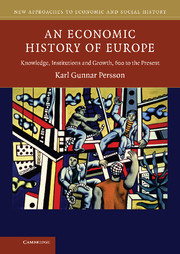Book contents
- Frontmatter
- Contents
- List of tables
- List of figures
- List of maps
- List of boxes
- Foreword
- Introduction: What is economic history?
- 1 The making of Europe
- 2 Europe from obscurity to economic recovery
- 3 Population, economic growth and resource constraints
- 4 The nature and extent of economic growth in the pre-industrial epoch
- 5 Institutions and growth
- 6 Knowledge, technology transfer and convergence
- 7 Money, credit and banking
- 8 Trade, tariffs and growth Karl Gunnar Persson and Paul Sharp
- 9 International monetary regimes in history by Karl Gunnar Persson and Paul Sharp
- 10 The era of political economy: from the minimal state to the Welfare State in the twentieth century
- 11 Inequality among and within nations: past, present, future
- 12 Globalization and its challenge to Europe
- Glossary by Karl Gunnar Persson and Marc P. B. Klemp
- Index
8 - Trade, tariffs and growth Karl Gunnar Persson and Paul Sharp
- Frontmatter
- Contents
- List of tables
- List of figures
- List of maps
- List of boxes
- Foreword
- Introduction: What is economic history?
- 1 The making of Europe
- 2 Europe from obscurity to economic recovery
- 3 Population, economic growth and resource constraints
- 4 The nature and extent of economic growth in the pre-industrial epoch
- 5 Institutions and growth
- 6 Knowledge, technology transfer and convergence
- 7 Money, credit and banking
- 8 Trade, tariffs and growth Karl Gunnar Persson and Paul Sharp
- 9 International monetary regimes in history by Karl Gunnar Persson and Paul Sharp
- 10 The era of political economy: from the minimal state to the Welfare State in the twentieth century
- 11 Inequality among and within nations: past, present, future
- 12 Globalization and its challenge to Europe
- Glossary by Karl Gunnar Persson and Marc P. B. Klemp
- Index
Summary
The comparative advantage argument for free trade and its consequences
David Ricardo (1772–1823) put forward the idea that countries trade in order to profit from their comparative advantages*. In his model, countries differ only in the productivity of their labour when producing different goods, and a country that is relatively efficient at producing something should export it. So, for example, England should export cloth to Portugal and import wine. An important implication of this theory is that countries should trade even if they do not have an absolute advantage in the production of goods: it is not whether a country is better at producing something than another that decides whether or not it should export it, but whether it is relatively better in comparison with other goods. The argument relates to the concept of opportunity costs* and is the same idea as we met in Chapters 2 and 4 as one of the bases of pre-industrial growth. When population or the “extent of the market” expands, specialization is possible. Trade allows the “extent of the market” to cross international borders and countries to specialize.
The concept of comparative advantage is often considered to be one of the most difficult to grasp in economics, but to understand it is crucial. In short, producing a good diverts labour from producing other goods, which are thus lost (the opportunity cost). Of course, in the absence of trade it is necessary to produce all goods, and this is unavoidable.
- Type
- Chapter
- Information
- An Economic History of EuropeKnowledge, Institutions and Growth, 600 to the Present, pp. 154 - 170Publisher: Cambridge University PressPrint publication year: 2010

